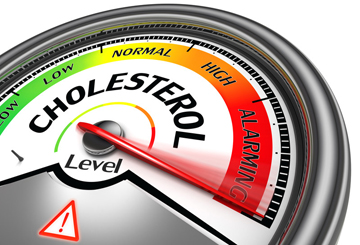September is observed as National Cholesterol Education Month to raise awareness among people about the dangers of high cholesterol.
 According to a recent study, nearly 71 million American adults have high cholesterol, putting them at risk for heart disease. A high cholesterol level in the blood is one of the main risk factors for heart disease and stroke, which are the two leading cause of death in the United States. Blood cholesterol screening measures your cholesterol levels and the results will determine if treatment is necessary.
According to a recent study, nearly 71 million American adults have high cholesterol, putting them at risk for heart disease. A high cholesterol level in the blood is one of the main risk factors for heart disease and stroke, which are the two leading cause of death in the United States. Blood cholesterol screening measures your cholesterol levels and the results will determine if treatment is necessary.
Cholesterol is a waxy, fat-like substance that your body needs. But when you have too much in your blood, it can build up on the walls of your arteries and form blockages resulting in heart disease, heart attack and stroke. High-density lipoprotein (HDL) and low-density lipoprotein (LDL) are two types of cholesterol. HDL is “good” cholesterol and LDL is bad cholesterol.
Even though the body creates some cholesterol on its own, we also get extra from animal-based food such as full fat dairy and meat. Unfortunately, high cholesterol does not have any symptoms, and so many people don’t know that their cholesterol is too high unless they see a doctor. Check with your doctor on your cholesterol levels regularly. Generally, bad cholesterol can be prevented a leading a healthy lifestyle. Here are some important preventive measures:
- A Healthy Diet: Staying healthy depends on a great deal on your diet. Eat foods that help keep your cholesterol levels low. Avoid saturated fat and trans fat which tend to raise the cholesterol levels. Include soya foods, soluble fiber foods like oats and barley, lots of fruits and vegetables, and foods that have plant sterols/stanols. Plant sterols/stanols are naturally found in a wide range of foods such as vegetable oils, nuts, seeds, whole grains, fruits and vegetables.
- Exercise Regularly: Exercise can help lower cholesterol. Any activity is helpful – even taking the stairs instead of the elevator or doing a few sit-ups while watching television can make a difference. Moderate physical activity can help to raise HDL or “good” cholesterol levels.
- Quit Smoking and Lower Alcohol Consumption: If you smoke, stop immediately. Quitting could improve your HDL cholesterol levels. It is reported that your blood pressure and heart rate would decrease 20 minutes after quitting, and that the risk of heart disease would be half that of a smoker within one year. Consume alcohol in moderation.
- Maintain a healthy weight: Losing weight can help lower your cholesterol. Being overweight or obese raises your cholesterol levels.
These tips can help maintain a healthy cholesterol level and decrease the risk of heart attack or stroke. Take your prescribed medicines regularly if your doctor recommends lowering your cholesterol, but keep up your healthy regimen. This will lower your medication requirements.